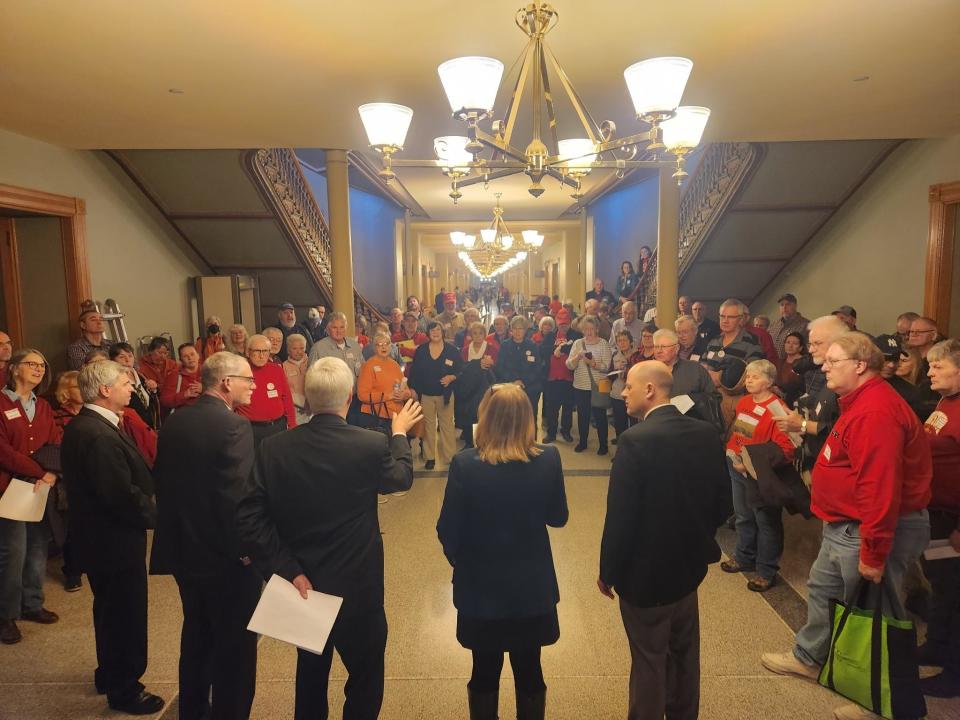Iowa would lose $10.3B a year in ethanol production without pipelines, report says
Iowa ethanol plants could close over the next decade without access to three proposed carbon-capture pipelines, a "catastrophic" hit that would ripple through the state economy, hitting farmers, livestock producers and rural residents, a new report funded by a renewable fuels group says.
Iowa's ethanol industry would lose three-fourths of its production, or about $10.3 billion annually, in the next five to 10 years to neighboring states, according to a report from Decision Innovation Solutions, a Des Moines-area economic consultant.
Lost ethanol production would cut 1 billion bushels of local demand annually for Iowa corn, used to make the biofuel, according to the report, funded by the Iowa Renewable Fuels Association. That would equal about 40% of last year’s corn harvest, according to U.S. Department of Agriculture data.

Diminished demand would depress corn prices, sending Iowa’s farm economy “into a tailspin,” said Monte Shaw, the renewable fuels association’s executive director.
"Many, many, many plants would close down" if the state loses 75% of its ethanol production, he said. "It would be devastating."
But pipeline critics say the study is meant to quell opposition.
"As someone who is going to spend the rest of my adult life farming … I'm not convinced the lack of a carbon pipeline is going to be the end of the ethanol industry," said Rep. Bobby Kaufmann, a Republican from Wilton.
"I don't doubt that the pipelines would complement the ethanol industry, but I do doubt this brimstone and fire, death of ethanol."
Emma Schmit, a senior Food & Water Watch Iowa organizer, said the study is designed to "scare pipeline opponents into submission."
"This industry fear-mongering is nothing new. And Iowans aren’t buying it," Schmit said in an email. "For over two years, landowners living along the proposed pipeline routes, including many corn ethanol farmers, report being subjected to repeat intimidation from corporations more interested in profiting off substantial federal subsidies than in bringing economic prosperity to Iowa communities."
The 60-page report, released Tuesday, comes as Iowa lawmakers are considering bills that would place restrictions on the construction of three controversial pipelines.
The battle of pipelines heads to the Capitol
Developers propose capturing carbon dioxide at 34 Iowa ethanol plants, liquefying it under pressure and moving it through the pipelines to Illinois or North Dakota, where it would be stored deep underground.
A broad coalition of opponents say the pipelines are dangerous, would damage underground drainage systems critical to farming in Iowa, cut yields and trample on landowner rights. They’re pushing state legislators to limit the companies’ access to eminent domain, which could force unwilling landowners to sell access to their property for the projects.

"Carbon pipeline developers and their allies are feeling threatened," Schmit said. "Dropping this report in the midst of a legislative session where multiple bills have been introduced ... only underlines that fact."
Sen. Jeff Taylor, a a Sioux Center Republican, has introduced five bills that seek to protect landowners — from stripping state regulators of their ability to grant eminent domain powers for hazardous liquid pipelines to requiring pipeline developers to get voluntary easements from 90% of the landowners who live along the pipeline routes.
Kaufmann said he will introduce legislation this week that also requires a voluntary easement threshold to enable pipelines to achieve "their goals while respecting property rights."
The importance of new federal tax credits on the ethanol industry
David Miller, chief economist at Decision Innovation Solutions, said Tuesday a new federal clean fuel tax credit created through the Inflation Reduction Act last year is a "game changer" for ethanol producers, creating "revolutionary public tax policy" that "incentivizes low-carbon fuels."
More:Builders vow CO2 pipelines will be safe. Worried Iowans point to a Mississippi rupture.
The tax credits, called 45Z for the section of federal tax code where they're located, could potentially provide ethanol companies about $165 per ton of sequestered carbon, Miller said.
Until recently, most of the ethanol industry's attention was on the 45Q tax credits, which were boosted to $85 per metric ton of carbon sequestered under the Inflation Reduction Act, up from $50 per ton.
Without the clean fuel tax credits, Iowa producers won't be able to compete with other Midwestern states, where Summit Carbon Solutions, Navigator CO2 Ventures and Wolf Carbon Solutions also have proposed pipelines, the report says. And North Dakota and Illinois have carbon sequestration locations already developed.
Over 10 years, Iowa could lose 3.5 billion gallons of production annually, the report says. And Iowa's losses would be its neighbors' gains: Nebraska ethanol producers would see $3.6 billion more annually in revenue; South Dakota, $3.5 billion; Minnesota, $2.2 billion; and Illinois, $911 million, the report says.
Producers in neighboring states that qualify for federal tax credits would first expand existing ethanol plants, Miller said. But then they'd likely build new plants as Iowa's ethanol plants lose their ability to compete.
Out-of-state producers would be able to pay off the new plant costs within six years, given the size of the tax credits, he said.
How prices could be impacted by pipelines
And while plants could choose to capture carbon dioxide and move it via rail or truck to be sequestered, both face hurdles, said Miller, who was Iowa Farm Bureau Federation's lead economist for three decades.
For example, trucking the carbon from all Iowa's ethanol plants would "put an additional 291,500 trucks on the road per year," the report says. And the railroad infrastructure doesn't fully exist to move carbon.
"The production is going to go somewhere," Shaw said. "If the pipelines can't go through Iowa, where it makes the most sense, they'll find the next best routes."
Miller said most Iowa ethanol plants have carbon intensity scores in the mid-50s. But the plants' score could be cut by more than half through pipeline carbon capture and sequestration. And farmers who add conservation practices, such as not tilling the soil, when they raise crops could lower the carbon intensity even more.
Iowa producers would see 40 to 60 cents more per gallon for their ethanol, value that would likely be spread along the supply chain, from farmers to pipeline developers to producers, Shaw said. The most ethanol producers could earn is $1 per gallon, under the clean fuel tax credit, said Miller, adding that producers cannot tap both 45Z and 45Q tax credits.
Taylor, the northwest Iowa senator, said the ethanol companies and their pipeline developer partners are saying "Iowans must give them everything they want — including the ability to disregard the Constitution and violate the property rights of farmers — or they will shut down.
"It’s a false choice," Taylor said in an email. "Such exaggerations are not believable or appropriate."
Donnelle Eller covers agriculture, the environment and energy for the Register. Reach her at deller@registermedia.com or 515-284-8457.
This article originally appeared on Des Moines Register: Iowa ethanol plants, without pipelines, face closures, study says
